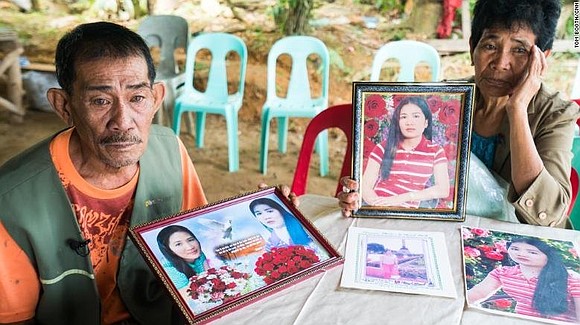Couple sentenced to death for murder of Filipina maid found in freezer
CNN/Stylemagazine.com Newswire | 4/4/2018, 8:17 a.m.

By Bard Wilkinson, CNN
(CNN) -- A Kuwaiti court has sentenced a Lebanese man and his wife to death in absentia for the murder of a Filipina maid, the Philippines Department of Foreign Affairs said.
The case of Joanna Demafelis, a 29-year-old maid whose body was found in a freezer earlier this year, prompted a diplomatic crisis between Kuwait and the Philippines, with Manila banning its citizens from working in the Gulf state.
Demafelis' body was discovered in the couple's abandoned apartment more than a year after she went missing. Nader Essam Assaf, a Lebanese national, and his wife Mona Hassoun, who is Syrian, were the subject of an Interpol manhunt.
Kuwaiti newspaper al-Qabas said a criminal court had on April 1 sentenced Assaf and his wife to death by hanging.
The Philippines government said Monday it had been informed of the sentence by a Kuwaiti official and added it had obtained a copy of the court decision.
Assaf has been detained in Lebanon, which is now considering a Kuwaiti extradition request, according to the Philippines Department of Foreign Affairs. Hassoun was detained in Syria, according to CNN Philippines.
The Kuwait Ministry of Justice did not immediately respond to CNN requests for confirmation.
'Swift action'
Philippines foreign affairs secretary Alan Peter Cayetano said Manila noted "the swift action taken by Kuwaiti authorities" in connection with Demafelis' murder.
"This is a very important development in our quest for justice for Joanna," he added.
The discovery of Demafelis' body in February led to a fiery outburst from Philippines President Rodrigo Duterte, who vowed to "sell his soul to the devil" to bring home workers who were being abused in Kuwait.
After Demafelis' death and other instances of worker abuse, Duterte's government offered free flights home for the 10,900 or so Filipinos who have overstayed their visas, and ordered a ban on the further deployment of workers to Kuwait.
Of more than 250,000 Filipinos in Kuwait, at least 60% are domestic workers who live and work in the homes of their employers for more money than they can earn at home.
Demafelis' family lost contact with her in May 2016, about two years after she arrived in the Middle East, according to CNN Philippines.
They said she never said anything bad about her employers, but had suspicions she was being watched. Demafelis was only able to speak to them three times a year.
During her last phone call, Demafelis said she planned to come home in 2018. But after not hearing from her for a nearly year, Demafelis' family reported her missing, her sister told CNN Philippines.
Investigators tried to find her through the Kuwaiti agency that recruited her, but discovered it had closed down



